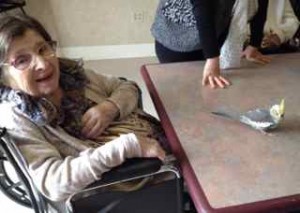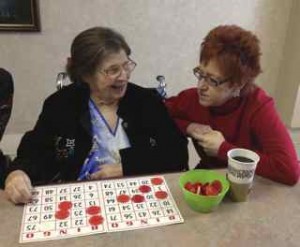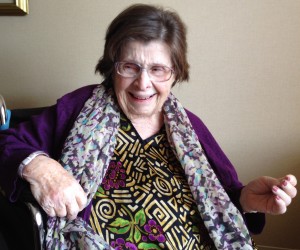
by Diane Masson | Jun 1, 2014
 Yesterday, I learned of a senior resident in California who was denied HER long-term care coverage in skilled nursing, because she had missed one payment while ill. Are you seriously kidding me? This is flat out wrong and it makes me angry. I have been in the senior living industry for fifteen years and always considered those with long-term insurance fortunate.
Yesterday, I learned of a senior resident in California who was denied HER long-term care coverage in skilled nursing, because she had missed one payment while ill. Are you seriously kidding me? This is flat out wrong and it makes me angry. I have been in the senior living industry for fifteen years and always considered those with long-term insurance fortunate.
Now I realize that when a senior is most vulnerable is also when they need this coverage to kick in. Who will fill out the paperwork? All the Continuing Care Retirement Communities where I work graciously accommodate residents in this area. But what about missing a payment to the long term care insurance company? This seems bound to happen.
According the Alzheimer’s Association one in three seniors die of dementia, so it would make sense that a senior with dementia or Alzheimer’s might miss a bill or two. So all those years of paying in for a higher level of care are negated when you are sick and demented? Come on, this is not acceptable.
Long-term care insurance is a security blanket to offset the high cost of future health care as you age. Many seniors have paid in for years to either have a policy that provides up to a certain dollar amount or certain time range (typically three years).
The senior and her family are all panicked. The son made numerous attempts to call his mom’s insurance company and would remain on hold for over forty minutes. Unbelievably, after he finally reached them thirty days later, the policy had expired two days before for lack of payment. If someone has been paying for long-term care insurance for years, you should not be penalized when you are sick and need the care the most. The family is appealing.
Has anyone else heard of this happening? Is this normal? Do you think it is okay?
Please consider joining this exclusive Marketing2Seniors blog and comment below to join the conversation and interact with other senior living professionals on what is currently being effective to increase occupancy on a nationwide basis.
Diane Twohy Masson is currently writing a new book for seniors on how to select senior housing options. Her first book, “Senior Housing Marketing – How to Increase Your Occupancy and Stay Full,” is available at Amazon.com with a five star rating. Masson continues to set move in records as the regional marketing director of two debt-free Continuing Care Retirement Communities in Southern California – Freedom Village in Lake Forest and The Village in Hemet, California. Her mom’s struggle with dementia is inspiring Diane to pen a third book to support adult children.
© Marketing 2 Seniors| Diane Twohy Masson 2014 All Rights Reserved. No part of this blog post may be reproduced, copied, modified or adapted, without the prior written consent of the author, unless otherwise indicated for stand-alone materials. You may share this website and or it’s content by any of the following means: 1. Using any of the share icons at the bottom of each page. 2. Providing a back-link or the URL of the content you wish to disseminate. 3. You may quote extracts from the website with attribution to Diane Masson CASP and link https://www.marketing2seniors.net For any other mode of sharing, please contact the author Diane Masson.

by Diane Masson | Mar 16, 2014

Do They Feel Harshly Criticized?
“Critique” and “evaluate” are two simple words but often misconstrued by the receiver.
In a recent team meeting, one department head described how one of her staff cries every time she tries to critique her. This makes it very difficult for this supervisor to work with her employee. The senior living team brainstormed together. Another department head said that it really should be called “evaluating performance” of the staff member and not critiquing.
It is the responsibility of supervisors in senior living communities to continually evaluate his or her residents and document everything (particularly in skilled nursing care, assisted living and memory care). It sounds so simple, yet when a supervisor starts evaluating the caregiver providing the care to the resident…it can be misinterpreted as harsh criticism.
Hopefully, supervisors continually critique themselves and try to improve their own coaching skills. How is a supervisor approaching an employee to administer an evaluation or yearly review? Everyone has different personalities and some supervisor’s direct approach can be confrontational to another personality type. Our marketing team just read, “How to Win Friends and Influence People,” by Dale Carnegie. It is an excellent book on how to interact with other employees. Evaluations should be capitalized on as a teaching opportunity, so the evaluated employee can continually improve.
Can you share how you evaluate your senior living employees? How do you handle an employee who reacts negatively and turns the performance improvement plan into a personal attack on them?
Please share your successes, failures or comment below to join the conversation and interact with other senior living professionals on what is currently being effective to increase occupancy on a nationwide basis.
Diane Twohy Masson is the author of “Senior Housing Marketing – How to Increase Your Occupancy and Stay Full,” available at Amazon.com with a 5-star rating. The book is required reading at George Mason University as a part of its marketing curriculum. Within this book, the author developed a sales & marketing method with 12 keys to help senior living providers increase their occupancy. Masson developed this expertise as a marketing consultant, sought-after blogger for senior housing and a regional marketing director of continuing care retirement communities in several markets. She has also been a corporate director of sales and a mystery shopper for independent living, assisted living, memory care and skilled care nursing communities in multiple states. Currently, Masson is setting move-in records as the regional marketing director of two debt-free Continuing Care Retirement Communities in Southern California – Freedom Village in Lake Forest and The Village in Hemet, California. Interestingly, this career started when she was looking for a place for her own mom and helped her loved one transition through three levels of care.
© Marketing 2 Seniors| Diane Twohy Masson 2013 All Rights Reserved. No part of this blog post may be reproduced, copied, modified or adapted, without the prior written consent of the author, unless otherwise indicated for stand-alone materials. You may share this website and or it’s content by any of the following means: 1. Using any of the share icons at the bottom of each page. 2. Providing a back-link or the URL of the content you wish to disseminate. 3. You may quote extracts from the website with attribution to Diane Masson CASP and link https://www.marketing2seniors.net For any other mode of sharing, please contact the author Diane Masson.

by Diane Masson | Mar 9, 2014

My Mom With Bird
My mom is 91 years old and has vascular dementia. She has slowly declined over the last nine years. Through my research, I can assume she is in one of the last two stages of dementia (there are seven). My mom has been in skilled nursing care for the last 9½ months and needs 100% assistance. The last thing that she could do on her own was feed herself.
Now she has dramatically declined in the last month and even needs assistance with eating. She is still a good eater, but does not have the cognition to eat on her own. It is too much work for her. Her short-term memory seems like it has decreased to about one-second.
Antipsychotic medications have reduced the amount and the intensity of her delusions, anxiety, crying and irritability. There have been medications added, increased and decreased in the last four months. It has been a balancing act to try to improve the quality of her emotions and cognition without having her become lethargic.
Now my mom’s memory loss has affected her ability to walk. At the last care conference meeting, we discussed the quality of her life and whether it is a good idea to try to make someone walk or not. It takes constant encouragement to get her walking and she keeps trying to sit down. I have advocated for the caregivers to keep trying to walk her daily. They never make her, but lots of encouragement can produce a walk to breakfast or lunch. By dinnertime, my mom’s Sundowners Syndrome with anxiety and crying make it impossible to walk her.
My mother seems confused and miserable when she walks and just wants to sit down. I want to try to decide in the next week, if I should just let advocacy regarding walking stop all together. In my opinion walking seems so important because it gets her circulation going and her memory seems to clear up. When the walking officially stops, the memory will for sure get worse. Maybe I just need to accept my mom is in the final stage of dementia and have her enjoy what she can…like playing with the new bird at the community.
Please share your successes, failures or comment below to join the conversation and interact with other senior living professionals on what is currently being effective to increase occupancy on a nationwide basis.
Diane Twohy Masson is the author of “Senior Housing Marketing – How to Increase Your Occupancy and Stay Full,” available at Amazon.com with a 5-star rating. The book is required reading at George Mason University as a part of its marketing curriculum. Within this book, the author developed a sales & marketing method with 12 keys to help senior living providers increase their occupancy. Masson developed this expertise as a marketing consultant, sought-after blogger for senior housing and a regional marketing director of continuing care retirement communities in several markets. She has also been a corporate director of sales and a mystery shopper for independent living, assisted living, memory care and skilled care nursing communities in multiple states. Currently, Masson is setting move-in records as the regional marketing director of two debt-free Continuing Care Retirement Communities in Southern California – Freedom Village in Lake Forest and The Village in Hemet, California. Interestingly, this career started when she was looking for a place for her own mom and helped her loved one transition through three levels of care.
© Marketing 2 Seniors| Diane Twohy Masson 2013 All Rights Reserved. No part of this blog post may be reproduced, copied, modified or adapted, without the prior written consent of the author, unless otherwise indicated for stand-alone materials. You may share this website and or it’s content by any of the following means: 1. Using any of the share icons at the bottom of each page. 2. Providing a back-link or the URL of the content you wish to disseminate. 3. You may quote extracts from the website with attribution to Diane Masson CASP and link https://www.marketing2seniors.net For any other mode of sharing, please contact the author Diane Masson.

by Diane Masson | Dec 22, 2013

Mom and Diane
Here is a shout out to all the special senior living employees who are working on Christmas this year. Every Boomer child who cares about his or her parent appreciates your dedication.
You may be cooking or serving the grand holiday buffet in an Independent Living Community, passing medications in an Assisted Living Community, calming anxiety in a Memory Care Community or providing 24-hour care in a Skilled Nursing – Thank You!
This Christmas, my mom is in Freedom Village Health Care Center. When I visited her on Thanksgiving morning, I saw smiles and joy in the eyes of the skilled nursing staff. Today, I am grateful that quality staff surrounds her and that she will be savoring her favorite coffee on Christmas morning.
Are you working on Christmas this year? Share your community name and what you do! Let’s spread some Christmas cheer!
Diane Twohy Masson is the author of “Senior Housing Marketing – How to Increase Your Occupancy and Stay Full,” available at Amazon.com with a 5-star rating. The book is required reading at George Mason University as a part of its marketing curriculum. Within this book, the author developed a sales & marketing method with 12 keys to help senior living providers increase their occupancy. Masson developed this expertise as a marketing consultant, sought-after blogger for senior housing and a regional marketing director of continuing care retirement communities in several markets. She has also been a corporate director of sales and a mystery shopper for independent living, assisted living, memory care and skilled care nursing communities in multiple states. Most recently Masson was recruited to consult for two debt-free Continuing Care Retirement Communities in Southern California – Freedom Village in Lake Forest and The Village in Hemet, California. Interestingly, this career started when she was looking for a place for her own mom and helped her loved one transition through three levels of care.
© Marketing 2 Seniors| Diane Twohy Masson 2013 All Rights Reserved. No part of this blog post may be reproduced, copied, modified or adapted, without the prior written consent of the author, unless otherwise indicated for stand-alone materials. You may share this website and or it’s content by any of the following means: 1. Using any of the share icons at the bottom of each page. 2. Providing a back-link or the URL of the content you wish to disseminate. 3. You may quote extracts from the website with attribution to Diane Masson CASP and link https://www.marketing2seniors.net For any other mode of sharing, please contact the author Diane Masson.

by Diane Masson | Nov 24, 2013

My Mom
My theory of 10 years is now officially broken. I believed that if you had a mean parent they turned nice with dementia and if you had a nice parent they would turn mean with dementia. My random sample was everyone that I have ever spoken to about this theory.
Well, the tables have turned and my mom has turned mean again. Years ago, the ugly side of my mom was only exposed behind closed doors. The mental abuse for years took a tool on all my siblings and I. In fact, when they each turned 18, all of them moved to other states. I stayed to protect my dad. I figured if she took half her wrath out on me, he would only be subjected to it 50 percent of the time.
In college, psychology classes opened my eyes to mental illness and depression. After my mean mom did not attend my graduation or marriage, I was done. A wonderful counselor taught me how to deal with it. When I spoke to my mom and she was mean, I would say, “I am sorry that this conversation is not going the way I hoped, I have to go now, bye.” After I did this three times, my mom’s treatment of me turned around. She has treated me well for 28 years.
Now, she is in the late stages of vascular dementia. I got a call two days ago saying she is yelling and swearing at the staff. Oh boy, my nice mom is gone. Say hello, to sundowners syndrome and her living in the past of about 30 years ago. Yesterday, I went to spend some quality time with her. The mean look was on her face. My mom harshly said, “Where have you been? You have a lot of gaul showing up now. Why haven’t you come to see me? Everyone is stealing all my things. The neighbors are selling off all my clothes. You are just showing me defiance. I am hungry, no one has fed me in days.” Then she pointed to one of the staff and said, “See, she is crying.” (No staff was crying.)
Little Diane, felt she was back in high school again. I kept my head and tried to talk her off the ledge (so to speak). She just continued ranting and repeating what she already had said. She was visible agitated. I handed her the banana I had brought and she relaxed by 50%. Every time she repeated that she was hungry, I invited her to eat the banana. She said, “I am not hungry, I will save it for later.” My husband and I continued to talk to her in a calm and reassuring way and an invisible sundowners switch finally turned her back to my nice mom.
About a half hour later, I explained to her that she had memory loss. I explained how I was helping her by having a doctor (podiatrist) trim her toenails this week and she screamed, “Don’t touch me, don’t cut my nails” at the top of her lungs. She said, “I did? Well one doctor hurt me a long time ago.” I told her about another doctor who came to do an eye exam and now she has new glasses and can read again. When she said that she could not understand the staff, I said, “Yes, your hearing is bad and we have an audiologist scheduled to come in and maybe get you a hearing aid.” She loved the explanations, enjoyed me being there, holding her hand and feeling calmness.
Eventually, I said, “Mother I heard that you were yelling and swearing at the staff this week.” She said, “I did? I can’t remember. I didn’t mean to.” Then I said, “When I came in today, you were mean to me and yelled at me.” My mom said, “I am sorry, I didn’t mean to, I don’t remember.” Well, all was forgiven and I was so glad that I did not walk out earlier that day by reliving the harsh criticism and mental abuse of the past.
If your parent has turned mean, just remember it is the monster disease of dementia, sundowners syndrome or Alzheimer’s. (I know it’s easier said that done.) As my mom sundowners continues to progress, I may have to hold onto this apology forever. She may not have the brain cells left in vascular dementia to be cognitive enough to apologize.
Her psychiatrist says the sundowners has progressed to the point of needing medications to help her. I am very protective of my mom and don’t want to over medicate her, but my mom has been in her own daily mental torture for about three weeks. My goal is to keep her comfortable and pain free. If the medications can give her peace, I am now all for them.
Please share your successes, failures or comment below to join the conversation and interact with other senior living professionals on what is currently being effective to increase occupancy on a nationwide basis.
Diane Twohy Masson is the author of “Senior Housing Marketing – How to Increase Your Occupancy and Stay Full,” available at Amazon.com with a 5-star rating. The book is required reading at George Mason University as a part of its marketing curriculum. Within this book, the author developed a sales & marketing method with 12 keys to help senior living providers increase their occupancy. Masson developed this expertise as a marketing consultant, sought-after blogger for senior housing and a regional marketing director of continuing care retirement communities in several markets. She has also been a corporate director of sales and a mystery shopper for independent living, assisted living, memory care and skilled care nursing communities in multiple states. Most recently Masson was recruited to consult for two debt-free Continuing Care Retirement Communities in Southern California – Freedom Village in Lake Forest and The Village in Hemet, California. Interestingly, this career started when she was looking for a place for her own mom and helped her loved one transition through three levels of care.
© Marketing 2 Seniors| Diane Twohy Masson 2013 All Rights Reserved. No part of this blog post may be reproduced, copied, modified or adapted, without the prior written consent of the author, unless otherwise indicated for stand-alone materials. You may share this website and or it’s content by any of the following means: 1. Using any of the share icons at the bottom of each page. 2. Providing a back-link or the URL of the content you wish to disseminate. 3. You may quote extracts from the website with attribution to Diane Masson CASP and link https://www.marketing2seniors.net For any other mode of sharing, please contact the author Diane Masson.

by Diane Masson | Oct 20, 2013
 An adult child or power of attorney plays a crucial role at a care conference. You can literally hold the pieces of the puzzle that an assisted living, skilled nursing care or memory care need in order to enhance the lifestyle of the resident.
An adult child or power of attorney plays a crucial role at a care conference. You can literally hold the pieces of the puzzle that an assisted living, skilled nursing care or memory care need in order to enhance the lifestyle of the resident.
No one alive knows my mom better than me. She cannot always advocate on her own behalf, because she has vascular dementia. If I asked her, “What would you rather have for dinner, prime rib or salmon?” My mom would say, “Diane you know what I like, you decide.” Even with her dementia, she knows that I will select her favorite choices from the past.
Recently, at my mom’s care conference in skilled nursing care a puzzle started to come together. My mom was having episodes of greater confusion. It might be three days in row and then she would be fine again. Was my mom’s dementia getting worse or was it something else? Would she need to start a new drug?
As we were brainstorming possibilities, I remembered how lack of sleep could intensive my mom’s dementia in the past. We figured out that the bed alarm of some of her recent roommates was affecting her sleep. When she experienced less sleep, then she would have episodes of greater delusion during the day.
It was an aha moment, so now they are going to focus on roommates who don’t need constant alarms going off. Hopefully my mom will improve. As a Boomer child, I have to be willing to accept that my mom’s dementia is getting worse, but maybe my advocacy can continue to help improve her quality of life for now.
Please share your success, failures or comment below to join the conversation and interact with other senior living professionals on what is currently being effective to increase occupancy on a nationwide basis.
Diane Twohy Masson is the author of “Senior Housing Marketing – How to Increase Your Occupancy and Stay Full,” available at Amazon.com with a 5-star rating. The book is required reading at George Mason University as a part of its marketing curriculum. Within this book, the author developed a sales & marketing method with 12 keys to help senior living providers increase their occupancy. Masson developed this expertise as a marketing consultant, sought-after blogger for senior housing and a regional marketing director of continuing care retirement communities in several markets. She has also been a corporate director of sales and a mystery shopper for independent living, assisted living, memory care and skilled care nursing communities in multiple states. Most recently Masson was recruited to consult for two debt-free Continuing Care Retirement Communities in Southern California – Freedom Village in Lake Forest and The Village in Hemet, California. Interestingly, this career started when she was looking for a place for her own mom and helped her loved one transition through three levels of care.
© Marketing 2 Seniors| Diane Twohy Masson 2013 All Rights Reserved. No part of this blog post may be reproduced, copied, modified or adapted, without the prior written consent of the author, unless otherwise indicated for stand-alone materials. You may share this website and or it’s content by any of the following means: 1. Using any of the share icons at the bottom of each page. 2. Providing a back-link or the URL of the content you wish to disseminate. 3. You may quote extracts from the website with attribution to Diane Masson CASP and link https://www.marketing2seniors.net For any other mode of sharing, please contact the author Diane Masson.

 Yesterday, I learned of a senior resident in California who was denied HER long-term care coverage in skilled nursing, because she had missed one payment while ill. Are you seriously kidding me? This is flat out wrong and it makes me angry. I have been in the senior living industry for fifteen years and always considered those with long-term insurance fortunate.
Yesterday, I learned of a senior resident in California who was denied HER long-term care coverage in skilled nursing, because she had missed one payment while ill. Are you seriously kidding me? This is flat out wrong and it makes me angry. I have been in the senior living industry for fifteen years and always considered those with long-term insurance fortunate.




